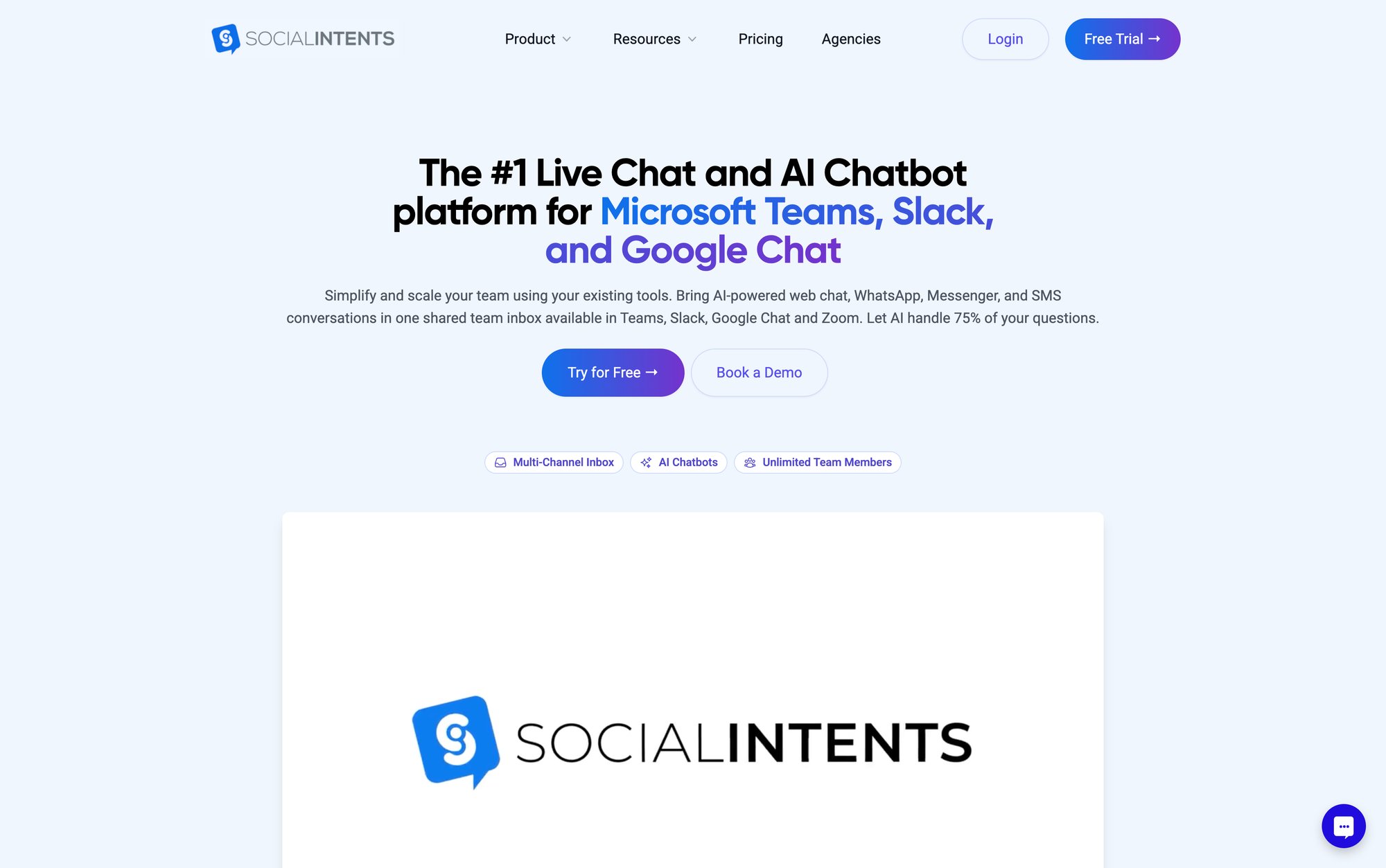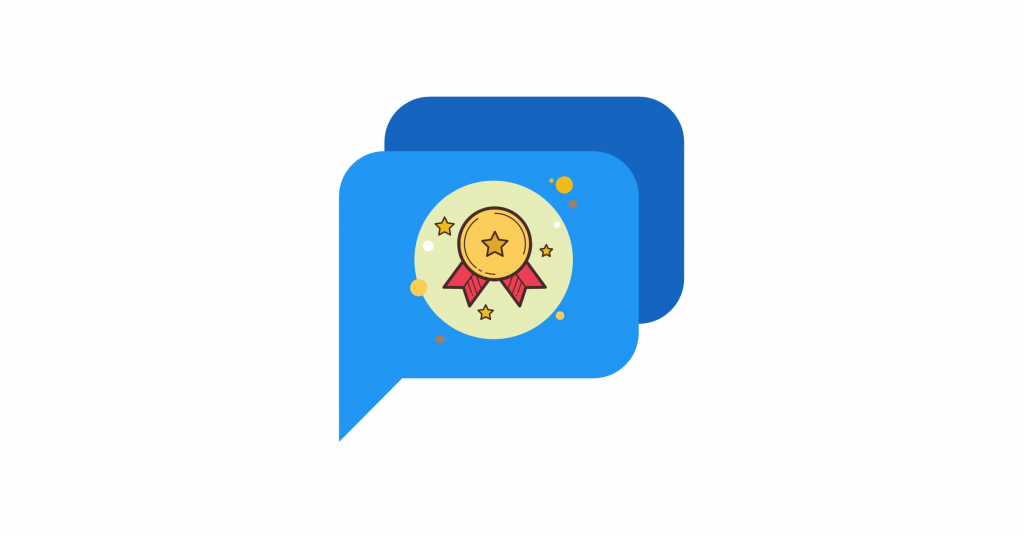Looking for a better live chat solution than Tidio? You’re in the right place.
Tidio works for some teams, but it’s not perfect for everyone. Maybe you’ve hit conversation limits faster than expected. Maybe the pricing jumped when you needed more features. Or maybe you just need something that fits your workflow better.
We’ve tested dozens of live chat platforms (including our own solution at Social Intents), and we know what actually matters. This guide breaks down 12 solid Tidio alternatives, with real pricing, actual features, and honest takes on who each tool works best for.
No fluff. No corporate speak. Just practical information to help you pick the right live chat platform.

Why Are Teams Switching from Tidio?
Tidio serves over 300,000 businesses with live chat, AI chatbots, and unified messaging. It’s a decent all-in-one platform. But here’s where it falls short:
Missing knowledge base integration. If self-service matters to you (and it should), Tidio doesn’t include a native FAQ or help center. Customers can’t find answers on their own, which means more repetitive chats for your team.
Pricing scales fast. Tidio’s starter plans look affordable until you need AI features, higher conversation limits, or advanced integrations. Costs can jump from $29/month to hundreds pretty quickly. Some alternatives give you more features at lower tiers or use unlimited agent pricing that’s easier to predict.
Slow feature updates. Some users feel like Tidio’s development pace lags behind competitors. If you want cutting-edge AI or rapid improvements, you might find better options elsewhere.
Limited customization. Tidio’s chatbot builder works, but it’s template-heavy. You can’t fully customize conversation flows beyond what they provide, which restricts complex use cases.

Top Tidio Alternatives Compared
There’s no universal “best” live chat tool. It depends on your team size, budget, technical setup, and how you work. Here are 12 alternatives that excel in different areas.
1. Social Intents (That’s Us)
We built Social Intents to solve a simple problem: why force your team to learn another dashboard when they already live in Microsoft Teams, Slack, or Google Chat?
The core idea: Website visitors chat with you through a widget on your site. Your team responds directly from Teams, Slack, Google Chat, Zoom, or Webex. No context switching. No separate support app.

Key Features and Capabilities
Chat from your existing tools. When someone starts a chat on your website, it routes into your Microsoft Teams channel or Slack workspace. Your team replies right there, in real time. It’s basically turning Teams or Slack into your customer support inbox.
AI chatbots that hand off smoothly. We integrate with OpenAI (ChatGPT), Anthropic (Claude), and Google’s models (Gemini). Train bots on your knowledge base or website content with one click. When the bot can’t handle something, it escalates to your team in Teams or Slack seamlessly.
Custom AI actions let you pull real data into conversations. Check order status via API, create support tickets, look up shipping information. Customers get instant, accurate answers without waiting for a human to look things up. Learn more about AI actions.
Unlimited agents on most plans. Starting with our Basic plan ($69/month), you can have as many agents as you want at no extra cost. No per-seat charges. Great for growing teams or companies that want lots of staff available without budget surprises.
Full widget customization. Match your brand with custom colors, logos, and greetings. Use proactive chat invitations to engage visitors. Developers get a JavaScript API to control when the widget appears or trigger specific chat flows.
Real analytics and productivity tools. Track response times, chat duration, customer satisfaction, and team performance. Agents get canned responses and slash commands (/tag, /transcript) to handle chats faster. Higher plans include auto-translation for multilingual support.
Social Intents Pricing
All plans come with a 14-day free trial:
| Plan | Price | What You Get |
|---|---|---|
| Starter | $39/month | 1 widget, 1 website, 3 agents, 200 chats/month, basic AI |
| Basic | $69/month | 2 widgets, 2 domains, unlimited agents, 1,000 chats/month, shortcuts |
| Pro | $99/month | 5 widgets, 5 domains, unlimited agents, 5,000 chats/month, no co-branding |
| Business | $199/month | 10 widgets, 10 domains, unlimited agents, 10,000 chats/month, auto-translation |
We also offer an Agency/Reseller plan ($299/month flat) for 20 white-labeled chatbots, used by partners managing live chat for multiple clients.
Is Social Intents Right for You?
You’re perfect for us if:
• You already use Teams, Slack, or Google Chat every day
• Your support or sales team wants to respond to website chats without learning a new tool
• You need unlimited agents without per-seat pricing eating your budget
• You want AI automation that hands off to humans naturally
• You value simplicity over complex workflows
You might want something else if:
• You don’t use any of the platforms we integrate with
• You need a standalone helpdesk with advanced ticketing
• You require extremely complex multi-level routing rules
We built Social Intents for teams that want convenience and integration. If that’s you, start your free trial and see how easy live chat can be when it works inside your existing workflow.
2. Intercom
Intercom is the premium option. Think of it as the Mercedes of customer messaging platforms.
It does everything: live chat, AI chatbots, email campaigns, user onboarding, product tours, and in-app messaging. If you need a single tool for support, sales, and customer engagement, Intercom probably has it.
Key capabilities:
• Multi-channel messaging across website, mobile apps, email, WhatsApp, and SMS. Everything funnels into one inbox.
• Highly customizable widgets with product tours, tooltips, targeted messages, and feedback collection. Trigger messages based on user behavior at different lifecycle stages.
• Powerful automation through bots that qualify leads, answer support queries, and suggest help articles. Their AI chatbot Fin pulls answers from your knowledge base.
• Analytics and lightweight CRM to track user events, segment audiences, and trigger campaigns based on behavior.
• Extensive app ecosystem for integrations with CRM, project management, translation tools, and more.
Pricing reality:
Intercom is complex and expensive. Plans start around $39/seat/month for Essential (or $29/seat annually), but costs add up fast. Advanced features run $99/seat/month, and Expert tier hits $139/seat/month. Plus you often pay extra for outbound messaging campaigns (~$99/month for 500 messages) and their AI bot Fin.
Best for: Established companies or fast-growing startups willing to invest for a rich feature set. If you need complex workflows (qualifying leads via chat, in-app onboarding messages, email campaigns) all in one system, Intercom delivers. Larger support teams appreciate the routing rules, SLAs, and collision detection.
Downsides: Expensive, steep learning curve, and feature bloat for simpler needs. Small businesses often find it overwhelming.

3. Crisp
Crisp offers a modern, sleek customer support platform centered on live chat and multi-channel messaging. Popular with startups and SMBs because of its clean interface and flat pricing per workspace.
What stands out:
Omnichannel inbox manages website chats, emails, WhatsApp, Facebook Messenger, Instagram DM, Telegram, Line, and more in one shared team inbox.
Co-browsing and Live Assist let agents see what’s on the customer’s screen during chat (with permission). Remote mouse control helps troubleshoot issues in real time.
Live translation built in. Agents write in one language, customers see it in theirs (and vice versa). Machine translation, but it works.
Chatbot and automation on higher tiers includes a no-code bot builder for FAQs and lead capture. Trigger messages based on page behavior.
Knowledge base and status page on higher plans for self-serve support.
| Plan | Price | What You Get |
|---|---|---|
| Free | $0 | 2 agents, basic chat widget, limited message history |
| Mini | $45/month | Up to 4 agents, unlimited chat history, canned responses, shared email inbox |
| Essentials | $95/month | Up to 10 agents, omnichannel inbox, knowledge base, workflow automation, AI chatbot |
| Plus | $295/month | ~20 agents, unlimited AI bot usage, advanced analytics, white-labeling |
Crisp doesn’t charge by conversation count. All plans allow unlimited chats and contacts, which can save money compared to per-ticket pricing.
Best for: Small to mid-sized businesses wanting multichannel support without complexity or high costs. Tech startups, SaaS companies, and e-commerce sites appreciate having chat, email, and social DMs in one place. The UI is clean and intuitive.
Limitations: If you need very advanced features (complex ticketing workflows, call center), Crisp might feel lightweight. Cheaper plans have seat limits.
4. LiveChat
LiveChat is a veteran in the space, known for reliable chat software focused on real-time website engagement. Widely used in customer support and sales teams, especially e-commerce.
Core features:
Fast, optimized chat widget with rich messages (images, product cards), forms, and real-time typing preview so agents can prepare responses.
Chat routing and teams automatically assign chats to specific teams or agents based on visitor location, URL, or time of day.
E-commerce features like product recommendations and upsell modules that agents use directly in chat. Integrates with e-commerce platforms and CRMs to show order details.
Comprehensive analytics track total chats, response times, wait times, conversion rates from chat, customer satisfaction, and agent performance.
Large integration marketplace connects to help desks, marketing tools, and their separate ChatBot product for AI automation.
Pricing (per agent, annual billing):
• Starter: $20/agent/month (basic live chat, unlimited chats, ticketing)
• Team: $41/agent/month (agent grouping, advanced management, chat routing)
• Business: $59/agent/month (deeper reporting, staffing prediction, SSO)
• Enterprise: Custom pricing (dedicated account manager, compliance features)
Monthly billing costs ~20% more per agent.
Best for: Mid-sized businesses and e-commerce companies where live chat is critical for sales or support. If chat quality and performance matter more than low cost, LiveChat delivers a polished product. Well-suited for dedicated support teams.
Downsides: Per-seat pricing adds up for larger teams. AI chatbot is a separate add-on starting ~$50/month.
5. Zendesk Chat (Zendesk Suite)
Zendesk is the giant in customer support software. Zendesk Chat comes as part of the Zendesk Suite, which bundles tickets, help center, voice calls, and live chat.
Major capabilities:
Unified ticketing and chat. Chats convert to tickets. Agents work from one dashboard handling emails, web tickets, phone calls, social messages, and live chats. Omnichannel consistency.
AI and automation with Answer Bot suggesting knowledge base articles in chat, plus powerful automation rules and triggers (escalate if no response in X minutes, auto-tag based on keywords).
Massive integration marketplace. Over 1,000 apps connect CRM systems, collaboration tools, translation services, analytics dashboards, and more. Show customer purchase history from Shopify inside a chat.
Knowledge base and community forums (Zendesk Guide and Gather) integrate with chat so customers can search help articles from the widget.
Enterprise features like skills-based routing, advanced analytics, custom roles and permissions, sandboxes for testing, and strong security compliance (SOC2, GDPR).
| Plan | Price/Agent (Annual) | Key Features |
|---|---|---|
| Team | $49/month | Basic omnichannel, standard knowledge base, basic analytics |
| Growth | $79/month | More automation, SLAs, multilingual help center, CSAT surveys |
| Professional | $115/month | Advanced reporting, chat routing, multiple brands, AI add-on access |
| Enterprise | $169/month | Custom roles, sandbox environment, AI features if purchased |
AI add-on costs extra (~$50/agent on top).
Best for: Organizations needing a full support platform at scale. If you have thousands of inquiries across email, chat, and phone, Zendesk provides structure to handle that complexity. Popular with large companies and enterprises.
Downsides: Overkill for pure live chat needs. Higher cost and complexity than single-purpose tools. Small businesses find it too much. Per-agent pricing means a 10-agent team on mid-tier runs close to $900/month.
6. JivoChat
JivoChat offers an affordable platform handling many channels in one app. Designed for small and mid-sized businesses that want to manage chats, calls, and social messages without expensive helpdesk software.
What it does well:
Multi-channel inbox handles live chats, Facebook Messenger, business WhatsApp, Apple Business Chat, email, and VoIP phone calls from one agent app.
In-app voice calls let visitors request callbacks or voice calls that connect through the browser. Agents switch from chat to call seamlessly, useful in sales.
Agent apps everywhere: desktop, mobile (iOS/Android), and browser-based so your team stays connected from anywhere.
Visitor monitoring and profiles show who’s on your site, what pages they’re viewing, and interaction history. Builds profiles with location, contact info, and previous chats.
Integrations and API connect with CRM systems and e-commerce platforms. Developer API and webhooks available for custom workflows.
Pricing (annual billing):
• Free: $0 for up to 5 agents, unlimited chats, 60-day chat history
• Basic (Professional): $28/agent/month ($19 if paid annually) adds chat triggers, detailed visitor info, integrations
• Enterprise (VIP): $56/agent/month ($39 annual) adds skill-based routing, video calls, mobile SDK
WhatsApp connectivity is a separate add-on (~$27/month annually).
Best for: Small businesses, startups, and freelancers needing cost-effective live chat that also handles calls and social messages. Great for businesses getting inquiries from multiple channels. The free plan with 5 agents is generous.
Limitations: Focus is breadth and affordability, not advanced AI or complex workflows. Interface is straightforward but might lack polish for larger organizations.

7. Re:amaze
Re:amaze is a customer support platform popular with e-commerce businesses. It unifies live chat, email, social media, SMS, and VOIP into one system.
E-commerce strengths:
Omnichannel inbox merges live chat, email, Facebook Messenger, Instagram comments/DMs, Twitter, and SMS into a shared team inbox.
Deep e-commerce integrations with Shopify, BigCommerce, WooCommerce, and Magento. Agents see customer order history, tracking info, and storefront data alongside conversations. Can refund orders or modify subscriptions from Re:amaze.
Automation and chatbots with triggers and FAQ bots. Auto-respond with articles when keywords detected, or escalate high-priority issues. Rule-based bots can hand off to humans.
Knowledge base module hosts public help articles. Chat widget suggests relevant FAQs when customers type questions.
Collaboration features like internal notes, collision detection, live screen-sharing, and video calls on higher plans. Customer satisfaction surveys after tickets.
Pricing (monthly):
• Basic: $29/user/month (core channels, one brand, basic automation)
• Pro: $49/user/month (SMS channel, advanced automation, reporting)
• Plus: $69/user/month (remove branding, live screen share, in-chat video calls)
• Starter: $59/month flat (unlimited team members, limited to 500 responded conversations/month)
Enterprise plan around $899/month for very large operations.
For e-commerce teams:
If you run an online shop, Re:amaze ties into your store for checking order status, initiating refunds, or verifying customer info without opening the Shopify admin separately.
Best for: Small-to-medium e-commerce companies wanting integrated customer service. Re:amaze integrates deeply with e-commerce platforms for efficient order management and customer verification.
Downsides: Less well-known than giants like Zendesk. AI capabilities aren’t as advanced out-of-the-box. But for e-commerce support channels, it’s highly regarded.
8. Gorgias
Gorgias is a helpdesk designed specifically for e-commerce stores. The go-to solution for many Shopify and BigCommerce merchants needing more than just chat.
E-commerce DNA:
Deep Shopify integration. Agents view customer order information, issue refunds, apply discounts, cancel or duplicate orders, and edit customer data without leaving Gorgias.
Full ticketing system. All customer communications (emails, chats, social messages) become tickets assigned, tagged, and tracked. Workflow for setting priorities, statuses, and measuring response times.
Automation and macros. Powerful rules and canned responses. Detect “shipping status” messages and auto-reply with tracking info pulled from Shopify. AI summary and intent detection help categorize tickets. Chatbot deflects common questions.
Social media and SMS support. Manage Facebook comments, Facebook Messenger, Instagram comments/DMs, and SMS texts in the same ticket queue.
Analytics focused on revenue. Track when support interactions (like chat answering product questions) led to purchases. Shows support’s influence on sales.
| Plan | Price/Month | Ticket Volume |
|---|---|---|
| Basic | $60 | Up to 350 tickets (extra tickets ~$25 per 100) |
| Pro | $300 | Up to 2,000 tickets |
| Advanced | $750 | Up to 5,000 tickets |
| Enterprise | Custom | Higher volume with custom pricing |
Best for: Mid-sized and large e-commerce businesses. If you run a Shopify Plus store with a dedicated support team, Gorgias is tailor-made. Centralizes customer communications and ties them into storefront data, making agents drastically more efficient. Popular with D2C brands.
Limitations: If you’re not in e-commerce, Gorgias loses its magic. Pricing by ticket volume can get expensive if you have tons of low-value chats.

9. Olark
Olark is a straightforward live chat solution that’s been around over a decade. It focuses on doing live chat really well, with emphasis on simplicity, accessibility, and friendly user experience.
What makes Olark different:
Live chat translation (paid add-on) translates between 100+ languages in real time. Useful if you get occasional chats in other languages but don’t have bilingual staff.
Accessibility focus. Chat widget designed with web accessibility standards in mind. Supports screen readers, keyboard-only navigation, and ensures users with visual or motor impairments can communicate. If ADA compliance matters, Olark stands out.
Transcripts and reporting. Auto-emails chat transcripts to you and customers. Searchable archive of chats. Basic reporting on volume, wait times, and top agents.
Data security and privacy. Anonymize or redact sensitive data in chats (like credit card numbers). Mask or block certain data from storage for privacy compliance.
PowerUps (add-ons). Core product stays simple. Optional add-ons like Visitor Insights ($59-$99) show more info about visitors, Co-browsing for screen sharing. À la carte approach means you only pay for extras you need.
Pricing:
• Standard Plan: $29/agent/month (unlimited chats, transcripts, basic integrations)
• Discounts for annual commitments (~$19/agent/month yearly)
• Add-ons: Translation +$29/month flat, Visitor Insights $59-$99/month
Best for: Small businesses, nonprofits, or teams needing simple, reliable live chat with no frills. Appeals to those who want customers to reach them easily without a complex system. Good choice for organizations with inclusivity mandates (universities, government).
Limitations: No AI chatbots or multi-channel beyond chat. Lacks flashy features. For modern SaaS or e-commerce needing Shopify integration, Olark might feel too basic.
10. Freshchat (Freshworks)
Freshchat is the live chat and messaging product in the Freshworks suite. An all-in-one messaging app that ties in with Freshdesk (helpdesk) and Freshsales CRM, but can work standalone.
Key features:
AI chatbot (Freddy AI). Deploy bots to handle common questions, provide answers from your knowledge base, and execute workflows (create ticket, check order status). Intent detection routes questions to bot flows or human agents.
Unified messaging inbox manages chats from website, mobile app, WhatsApp, Apple Business Chat, Facebook Messenger, and more in one place. Turn chats into Freshdesk tickets if needed.
Proactive campaigns. Set up triggered messages or chatbot flows to engage visitors based on behavior (pop up “Need help?” if someone’s on pricing page for 30 seconds).
Integration with Freshworks ecosystem. If you use Freshdesk or Freshsales, Freshchat integrates out of the box. Chats create tickets or update leads automatically.
Analytics and CSAT with dashboards for chat volume, response times, resolution times, and customer satisfaction surveys.
| Plan | Price/Agent (Annual) | Bot Sessions | Key Features |
|---|---|---|---|
| Free | $0 | Up to 10 agents | Generous but lacks bot sessions |
| Growth | $19/month | 500 bot sessions | Basic automation, additional channels |
| Pro | $49/month | 3,000 bot sessions | Advanced dashboards, WhatsApp, CSAT surveys |
| Enterprise | $79/month | Higher bot limits | Skill-based routing, custom bots, priority support |
Month-to-month costs ~20% higher.
Best for: Companies in the Freshworks ecosystem or those wanting capable chat at lower cost than Intercom or Zendesk. Small and mid-sized businesses benefit from Growth plan’s affordability with bot functionality. Support teams planning to scale can start with Freshchat and add Freshdesk later.
Considerations: Less sales/marketing-focused than Intercom. Best suited for customer support use cases.
11. HelpCrunch
HelpCrunch combines live chat, email automation, and a help desk into one tool. Like a blend of Intercom for chat/emails and a simpler helpdesk.
All-in-one approach:
Live chat plus email marketing. Not just live chat. Includes email automation. Capture leads via chat then send automated email drip campaigns, or follow up on chats with emails, all from one platform.
Knowledge base where you create help articles and FAQs. Chat widget surfaces these articles. Public Help Center site available.
Pop-ups and forms to appear on your site for various use cases (collect email for newsletters, offer discounts to exiting visitors). Info captured goes into HelpCrunch contacts.
CRM and user tracking. Track user behavior on your site/app. Mini-CRM profile for each contact shows pages visited, messages received. Segment users for targeted messaging.
Multichannel and integrations. Core is chat and email. WhatsApp or Messenger support via integration. Integrates with HubSpot, Salesforce, Slack to sync contact data or send notifications.
Pricing (affordable for features):
• Standard: $15/user/month (live chat, knowledge base, basic email newsletter, one automated sequence)
• Premium: $25/user/month (unlimited automated sequences, advanced targeting, remove branding)
• Unlimited (Enterprise): $495/month annual or $620/month monthly (flat rate, unlimited team members and contacts, all features)
All plans have 14-day free trial.
Value proposition:
If you’re considering Tidio for chat and email marketing, HelpCrunch offers more robust email capability alongside chat. Like having mini-Intercom at a fraction of the price, great for early-stage companies.
Best for: Startups, SaaS companies, or small businesses consolidating tools. The combination of live chat and email automation makes HelpCrunch ideal for teams managing both reactive support and proactive engagement.
Value for money is high. Interface praised as user-friendly and modern. Good for content and marketing-oriented teams managing proactive engagement and reactive support in one place.
Limitations: May show limits for enterprises or very specialized needs. Not as deeply configurable as dedicated helpdesks or as “smart” as top-tier AI tools. Currently lacks phone support integration.

12. LiveAgent
LiveAgent is full-featured help desk software offering live chat as one of many channels. Think budget-friendly alternative to Zendesk. Combines ticketing, live chat, call center, and social media in one.
Comprehensive features:
Omnichannel ticketing routes all incoming messages (emails, chats, phone calls, social media) into tickets within a unified dashboard. Agents respond to all channels from there. Covers less common channels like Viber messages.
Built-in call center. Includes VoIP call center capabilities. Connect phone numbers, receive calls in the software, use IVR menus, transfer calls. Calls logged as tickets. One-stop solution for call and chat support.
Unlimited ticket history. Keeps all tickets across channels unless you choose to purge. Useful for auditing and long-term reference.
Automation and rules to assign tickets to departments, send escalation emails, tag conversations based on keywords. SLA policies track if tickets answered within agreed times.
Customer portal and knowledge base hosts knowledge base, forums, and suggestion boards for self-service and community interactions.
Collaboration features. Agents chat internally, leave notes on tickets, see who’s viewing or typing on a ticket in real-time to avoid collisions.
| Plan | Price/Agent (Monthly) | Channels Included |
|---|---|---|
| Ticket | $15/month | Ticketing helpdesk without live chat |
| Ticket+Chat | $35/month | Adds live chat, advanced social integrations, built-in call center |
| All-Inclusive | $59/month | Unlimited call center features, all social channels, workflow automation, time tracking, audit logs |
| Free Plan | $0 | Limited for 1 agent with basic features |
Annual billing lowers prices by ~20-30% (All-Inclusive at $49/agent/month annually).
Best for: Businesses wanting 360° helpdesk (chat, email, phone) without breaking the bank. If you were juggling Tidio for chat plus separate ticketing or phone line, LiveAgent consolidates those needs. Useful for support teams managing lots of email and phone support in addition to chat. Tech companies providing B2B support, or service providers handling requests across various channels.
Trade-offs: More traditional helpdesk feel (less marketing flair, more about support efficiency). Doesn’t have built-in AI bots or flashy engagement tools, but reliable and feature-rich for service operations. Learning curve and UI not as modern as newer apps. Very small teams needing only chat might find it too much. But for growing support teams that might need call center or advanced routing later, LiveAgent offers tremendous value by bundling it all.

How to Choose the Best Tidio Alternative for Your Team
The “best” Tidio alternative depends on what you actually need:
If you want AI chatbots with a different approach: Check out Intercom (premium AI + messaging suite) or Freshchat (solid AI, cheaper per agent). For budget chatbot options, Crisp includes AI in higher tiers. Social Intents offers choice of ChatGPT, Claude, or Gemini with custom AI actions.
If Tidio’s pricing was the issue: Look at Social Intents (unlimited agents) or HelpCrunch (rich features at low per-user cost). Olark can also be cost-effective for basic chat.
If you need knowledge base or ticketing (Tidio lacks these natively): Zendesk Suite or LiveAgent cover both. Re:amaze works great for e-commerce.
If integration with your workflow matters: We built Social Intents specifically for answering from Slack/Teams/Google Chat. Gorgias and Re:amaze excel at e-commerce platform integrations.
Simplicity versus complexity: Olark and JivoChat are straightforward for small teams. Intercom and Zendesk are powerful but require more setup and investment.
Think about where your business is headed. Maybe you only need simple chat today, but in a year you might need automation or multi-channel support. Choose a tool that can grow with you.
Most alternatives offer free trials. Take advantage. Test the interface and features with your actual workflow.

What Makes Social Intents Different from Tidio
Here’s what we learned building live chat software: the biggest barrier to adoption isn’t features or pricing. It’s forcing teams to use yet another tool.
That’s why we built Social Intents to work inside the apps your team already uses. When a customer chats on your website, it appears in your Teams channel or Slack workspace. Your team replies right there. No separate login. No context switching. No training.
We’ve helped thousands of teams across different industries:
E-commerce stores use us through native Shopify, BigCommerce, and WooCommerce integrations to handle customer questions without pulling agents away from their workflow.
SaaS companies route product support chats into Teams channels organized by product line or region, keeping support organized and fast.
Agencies and resellers use our white-label solution to offer live chat as a service to their clients, managing dozens of chatbots from one account.
The unlimited agents on our Basic plan and up means you don’t worry about adding team members. Everyone who might help a customer can be available. No budget surprises.
Our AI chatbots handle routine questions 24/7, then escalate naturally to your team when needed. The custom AI actions let you integrate with your existing systems (pull order data, create tickets, check inventory) so customers get accurate information instantly.
Want to see how easy live chat can be when it fits your workflow? Start your free 14-day trial. No credit card required. Install the widget, connect to Teams or Slack, and be chatting with customers in under 10 minutes.

Tidio Alternatives: Frequently Asked Questions
What’s the main difference between Tidio and Social Intents?
Tidio requires agents to use their standalone dashboard or mobile app. Social Intents routes chats directly into Microsoft Teams, Slack, Google Chat, Zoom, or Webex so your team can respond from tools they already use. We also offer unlimited agents on most plans while Tidio has agent limits on lower tiers.
Can I migrate my chat history from Tidio to another platform?
Most platforms don’t automatically import chat history from Tidio. You can usually export transcripts from Tidio as CSV or download individual conversations, then manually import them into your new platform if it supports bulk uploads. Check with your new platform’s support team about migration options.
Which Tidio alternative is best for small teams?
For small teams, Social Intents works great if you use Teams or Slack (unlimited agents starting at $69/month). JivoChat offers a generous free plan for up to 5 agents. Olark is simple at $29/agent/month. Crisp’s Mini plan ($45/month for 4 agents) is also solid. Choose based on which integrations you need.
Do any Tidio alternatives offer better AI chatbots?
Intercom’s Fin AI is more advanced but expensive. Freshchat’s Freddy AI offers solid capabilities at lower cost. Social Intents lets you choose your AI model (OpenAI ChatGPT, Anthropic Claude, Google Gemini) and includes custom AI actions to integrate with your existing systems. The best AI chatbot depends on your specific use case and how much you want to spend.
Which platforms integrate with Microsoft Teams like Social Intents?
Social Intents is built specifically for Teams integration, routing website chats directly into Teams channels. While some platforms (like Zendesk or Freshchat) offer Teams notifications, they don’t let you respond directly from Teams. If Teams-native chat handling is important, we’re the dedicated solution for that workflow.
What’s the most affordable alternative to Tidio?
JivoChat’s free plan supports 5 agents. Olark starts at $29/agent/month. Social Intents offers unlimited agents from $69/month (Basic plan), which becomes very affordable per agent as your team grows. HelpCrunch’s Standard plan is $15/user/month. The most affordable option depends on your team size and required features.
Can I use these alternatives for e-commerce support?
Yes. Gorgias and Re:amaze are built specifically for e-commerce with deep Shopify/BigCommerce integrations. Social Intents has native apps for Shopify, BigCommerce, Wix, and WordPress. LiveChat, Crisp, and Intercom all work well with e-commerce platforms. Choose based on whether you need e-commerce-specific features (order lookups, refund processing) or just basic chat support.
Do these alternatives support WhatsApp and Facebook Messenger?
Many do. Crisp, Freshchat, JivoChat, Re:amaze, and Gorgias all support WhatsApp and Facebook Messenger in their omnichannel inboxes. Social Intents offers WhatsApp chatbots with escalation to human agents. Olark and LiveChat have more limited social messaging. Check each platform’s feature list for specific channel support.
Which alternative is best for unlimited chat conversations?
Crisp doesn’t limit conversations on any plan. Social Intents limits by monthly conversations based on plan tier (200 to 10,000+). Intercom, Zendesk, and most others don’t limit conversation volume but charge per agent. If high conversation volume is your main concern, Crisp or platforms with per-agent (not per-conversation) pricing work best.
How long does it take to set up a Tidio alternative?
Most platforms take 10-30 minutes for basic setup. Social Intents installs in under 10 minutes (add to Teams/Slack, embed widget code on site, configure basics). More complex platforms like Zendesk or Intercom might take hours or days to configure fully with all routing rules, integrations, and customizations. Simple solutions (Olark, JivoChat) are faster. Complex platforms require more setup time.


